One hundred and eight Fellows from 49 different locations or organizations graduated from the Daniel K. Inouye Asia-Pacific Center for Security Studies’ Comprehensive Security Responses to Terrorism (CSRT) 18-1 course in Honolulu Aug. 8.
The size of this course and number of locations represented are the most ever for a CSRT at the Center.
Of the 108 participants, 64% were from military organizations and law enforcement agencies, with others representing various government ministries, foreign affairs departments and intelligence services and academic institutions. Just over half of the course participants were from the Indo-Pacific region, with five continents represented.
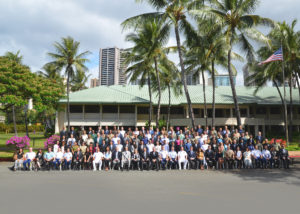
CSRT 18-1 Fellows pose for their official group photo with DKI APCSS leadership and faculty in front of the building.
Fellows participating in CSRT 18-1 were from Afghanistan, Albania, Bangladesh, Cambodia, Cameroon, Chad, China, Colombia, Costa Rica, Dominican Republic, Egypt, Fiji, Guyana, Indonesia, Japan, Kazakhstan, Kosovo, Laos, Lebanon, Madagascar, Malaysia, Maldives, Mexico, Mongolia, Morocco, Myanmar, Nepal, Nigeria, Oman, Papua-New Guinea, Philippines, Serbia, Sierra Leone, Spain, Sri Lanka, Suriname, Taiwan, Thailand, Tonga, Tunisia, Uganda, United States, Uruguay, and Vietnam. One regional organization, the International Committee of the Red Cross (ICRC) was also represented.
DKI APCSS Director retired Rear Adm. Peter A. Gumataotao addressed the CSRT Fellows during the commencement ceremony.
“I think you guys really tell me what you’ve learned, actually not by words, but by your actions after this,” he said. “The best is yet to come from that.
“I’ve met many of you and I’ve seen the list of ambitious and important projects you’re preparing, and I believe every one of you can make a positive difference,” Gumataotao continued. “My advice is simply to be patient, to be persistent, to be passionate and to be courageous in your actions.”
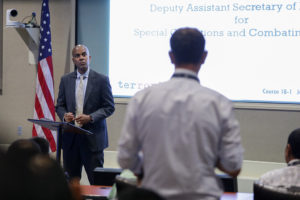
A highlight of the CSRT was when keynote speaker Deputy Assistant Secretary of Defense for Special Operations and Combating Terrorism, Mr. Andrew F. Knaggs spoke to the Fellows about the security challenges of the Indo-Pacific Region Aug. 7. Here, he takes questions at the end of his presentation.
CSRT is an annual, special focus course that provides security practitioners from the Indo-Pacific region and around the world the operational and strategic-level skills necessary to enhance their ability to combat terrorism while cooperating with other regional partners. Through faculty lectures and guest speaker presentations in plenary sessions, real-world case studies, seminar discussions and collaborative experience and perspective sharing, Fellows explore the nature of current and future terrorist threats, examine the challenges associated with countering ideological support for terrorism and violent extremism, achieve a more common understanding of global and regional terrorism challenges, analyze tools and capabilities for combating terrorism and transnational threats in order to promote appropriate strategies. It is also designed to build relationships between and among the United States and current and future counterterrorism practitioners of participating countries, for the purpose to develop the trust and confidence necessary for increased information sharing while identifying ways to reduce obstacles to cooperation in the international struggle against those who use terror to promote their goals.
“While terrorism may be “demoted” one notch in the latest US national security documents, many of our partners and allies in the Indo-Pacific see it as a leading threat—or the leading threat,” explained Course Manager Dr. Christopher Harmon. “Whether beginning or finishing the CSRT course, over half of all Fellows see terrorism as a greater threat to the region than four or five years ago.”
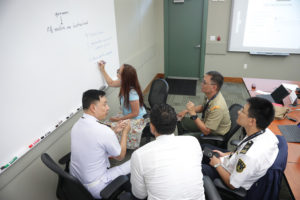
Intense discussions and problem-solving during seminar talks are a crucial part of isolating the complexity of terrorism.
This CSRT course was divided into three modules and held between plenary and smaller, seminar sessions. The first, “The Problems, The Causes, The Agents,” provided a framework with which to view contemporary terrorism and violent extremism through the exploration of historical examples, including the origins, motivations, environmental influences and other contributing factors that fuel terrorism. The second part, “Toward a Comprehensive Response to Terrorism,” explored various approaches to counter, deter and mitigate terrorism, including building whole of government cooperation, regional and international collaboration capacity, development of intelligence and information sharing technologies, and related legal complexities.

Twenty-two percent of the Fellows in this course were women, who are disproportionately affected by terrorism and natural disasters. Having that perspective in the discussion allows Fellows to develop more comprehensive strategies in combatting terrorism.
The final part, “An Exercise in Strategy-Building,” had the Fellows grouped by sub-regions to develop counterterror strategies against evident threats in their regions. This enabled them to work with other Fellows from their regions, in some cases breaching national rivalries, to first better understand the biases that drive decision making in their cultures and later to examine future trends in their regions and the priorities along with the elements needed for a viable counterterrorism plan to collectively mitigate emerging terrorist activities and threats.
“In polling and in the Strategy-Building exercise, we heard repeatedly from Fellows that during the course, they learned to think more broadly about ways to defeat terrorists.,” Harmon continued. “This class came in thinking that politics and political problems are by far the leading cause of terrorism, and they departed with even higher numbers thinking that, which was 53%. Back-briefs from the Strategy Exercise disclosed wide concern about borders and inadequacies in border control.”
However, Fellows seemed well-equipped to face terrorism challenges as a result of the course.
“Our experience here at APCSS has been very powerful and a very high value, because it not only educates us and connects us as security practitioners, but also helps us have a shared understanding of security threats, challenges that we face today, explained Lt. Col. Fatos Makolli, Director, Counter Terrorism Directorate, Kosovo Police. “It also highlights some of the best practices and ways to deal with them. APCSS offers a lifelong network of professionals and practitioners who with continue to exchange, share and support each other in the long term. I believe this course and the lessons that I’ve learned here together with the knowledge I’ve gained through experience so far as a Fellow will help me to be better in my daily job.”
The Daniel K. Inouye Asia-Pacific Center for Security Studies is a Department of Defense academic institute that addresses regional and global security issues. Military and civilian representatives, most from the U.S. and Asia-Pacific nations, participate in a comprehensive program of executive education, professional exchanges and outreach events, both in Hawaii and throughout the Indo-Pacific region. The Center supports the U.S. Info-Pacific Command by developing and sustaining relationships among security practitioners and national security establishments throughout the region. DKI APCSS’ mission is to build capacities and communities of interest by educating, connecting, and empowering security practitioners to advance Indo-Pacific security. It is one of the Department of Defense’s five regional security studies centers.
Since opening in 1995, the Center has had representatives from 135 countries and territories attend courses at the Center for a total of 12,380 alumni.


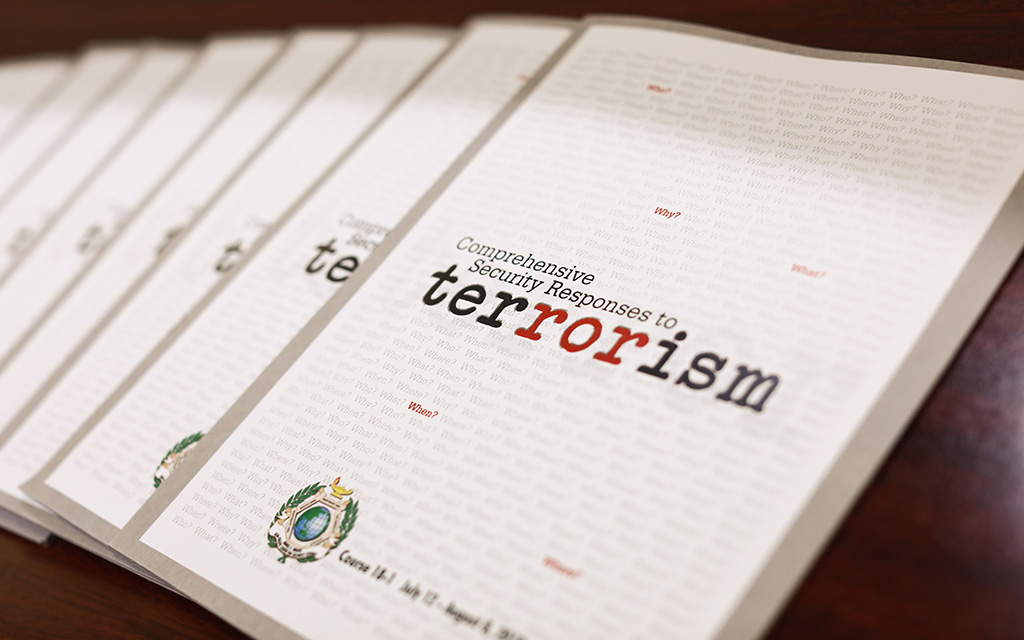
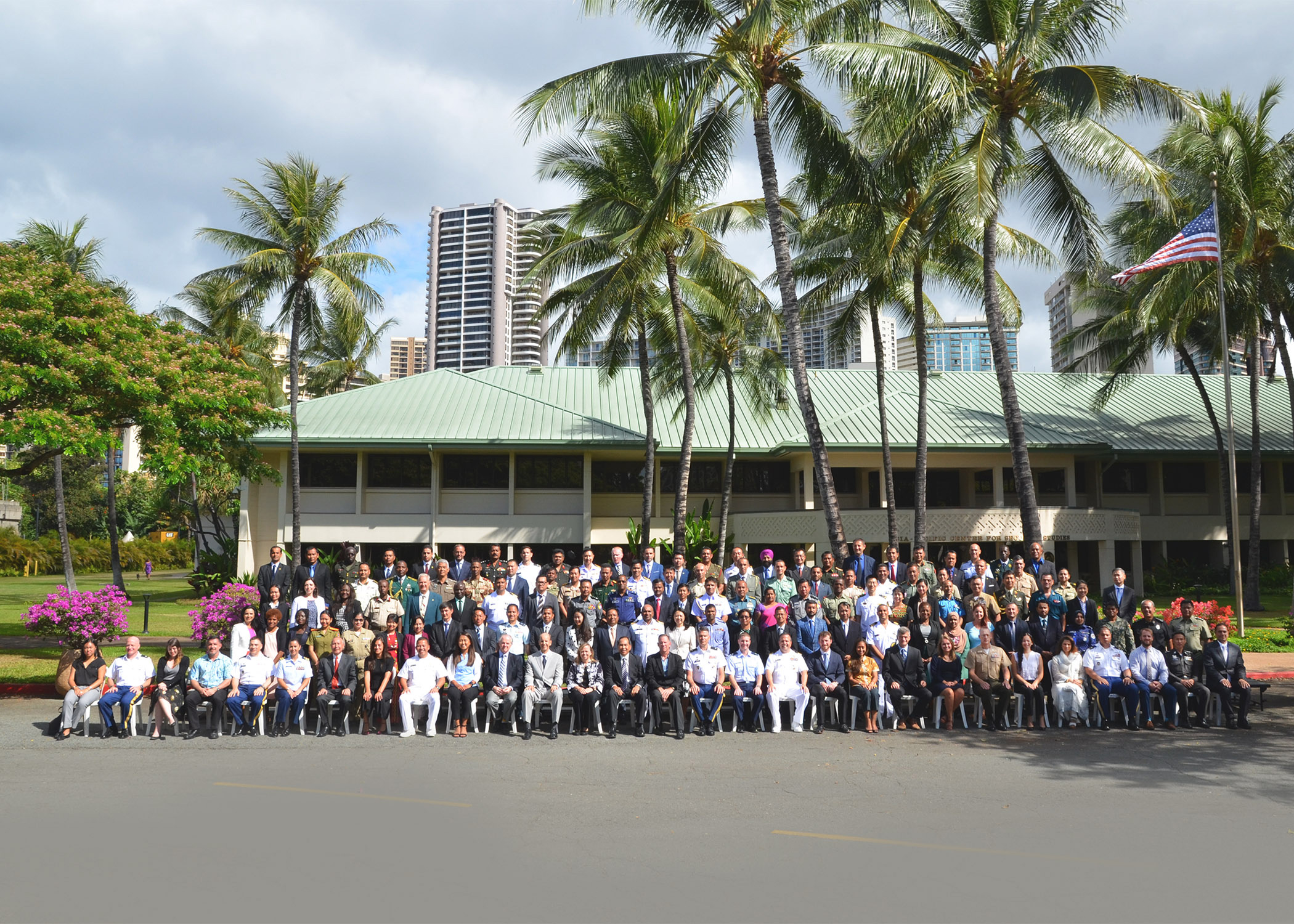
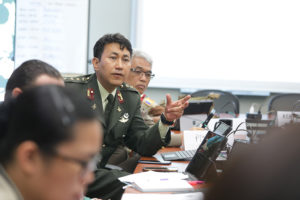
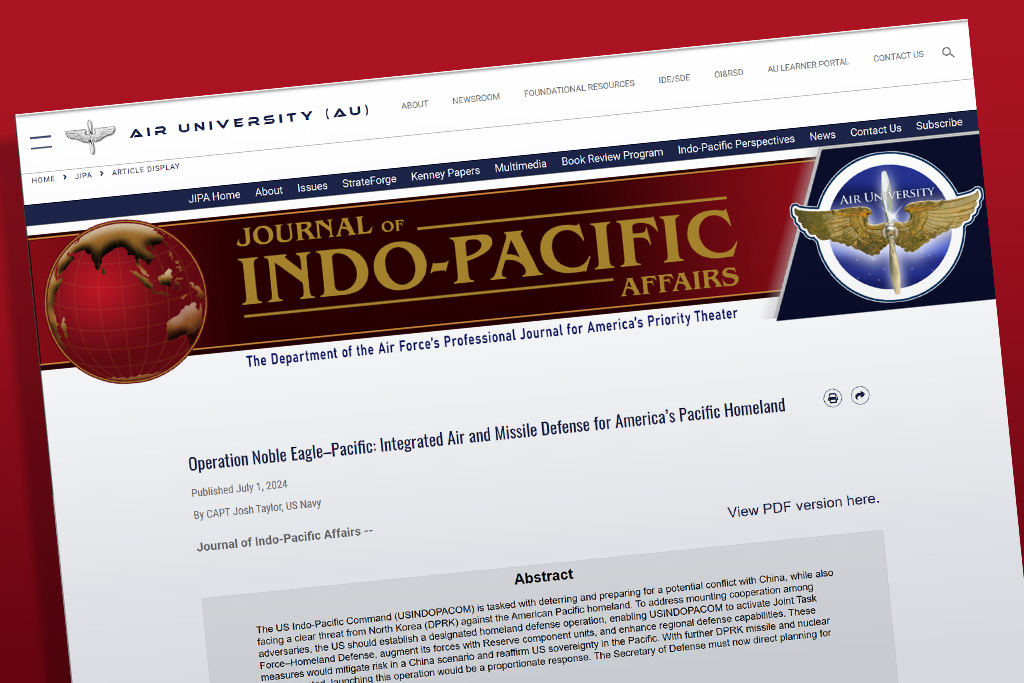
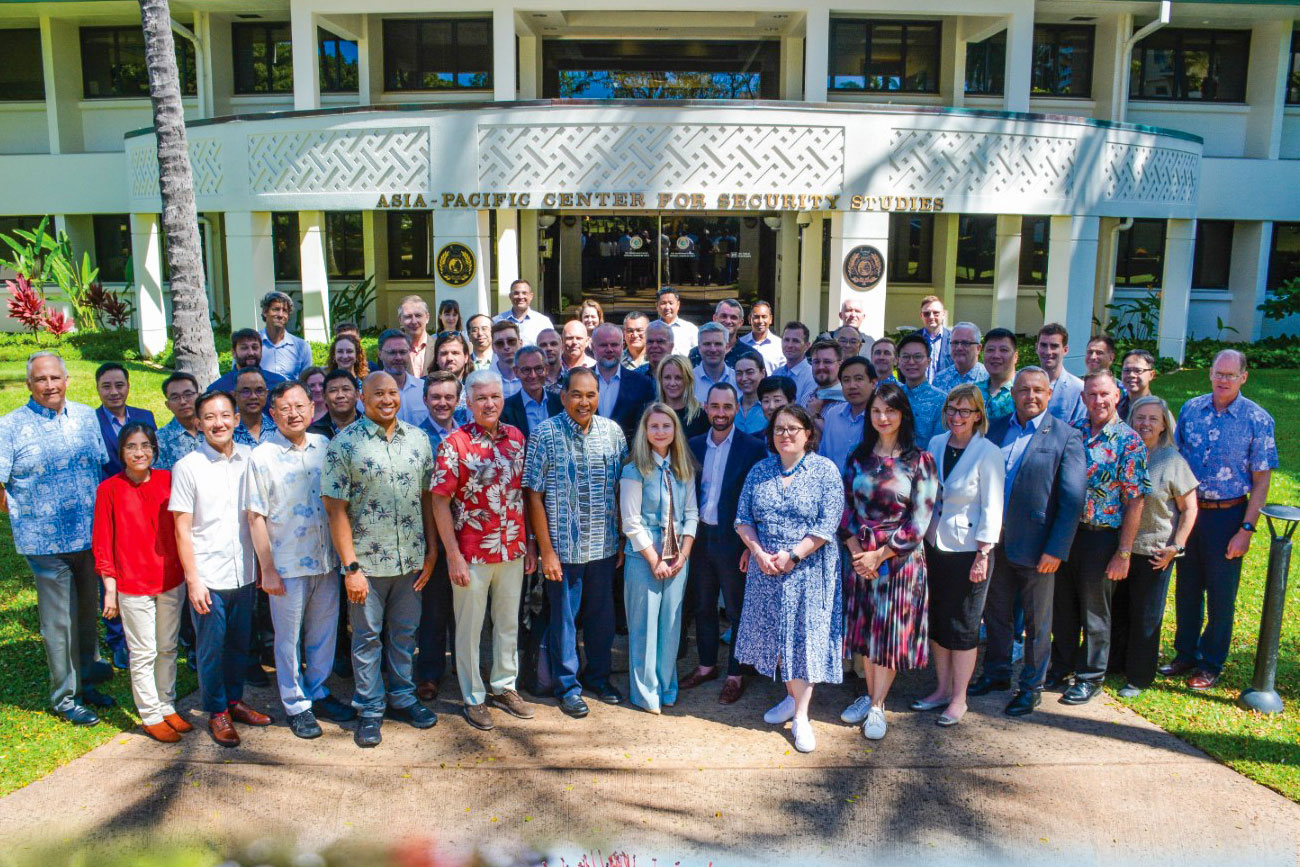
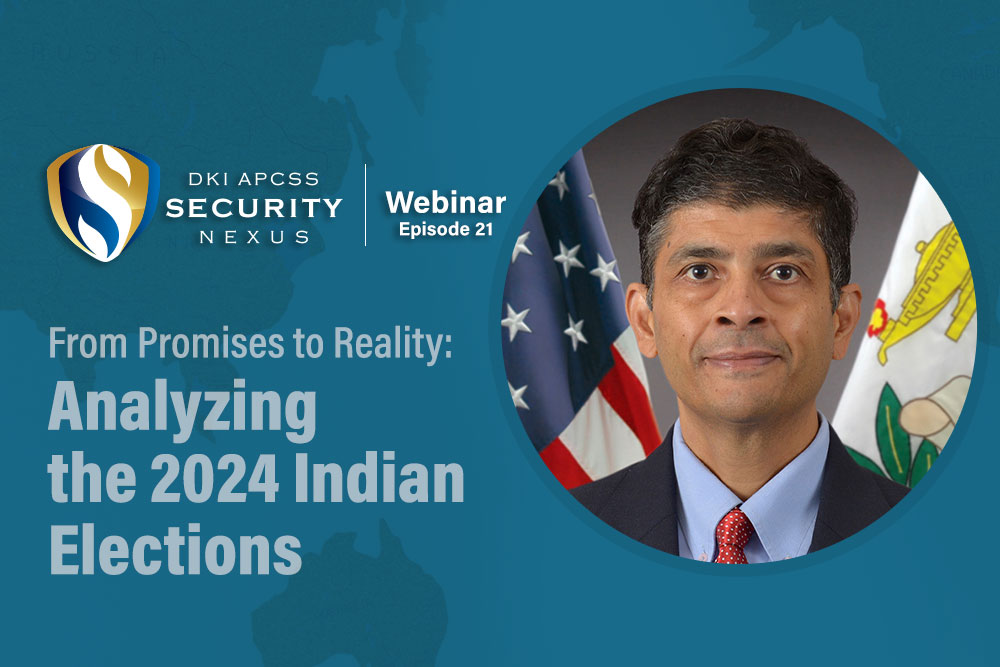




Leave A Comment